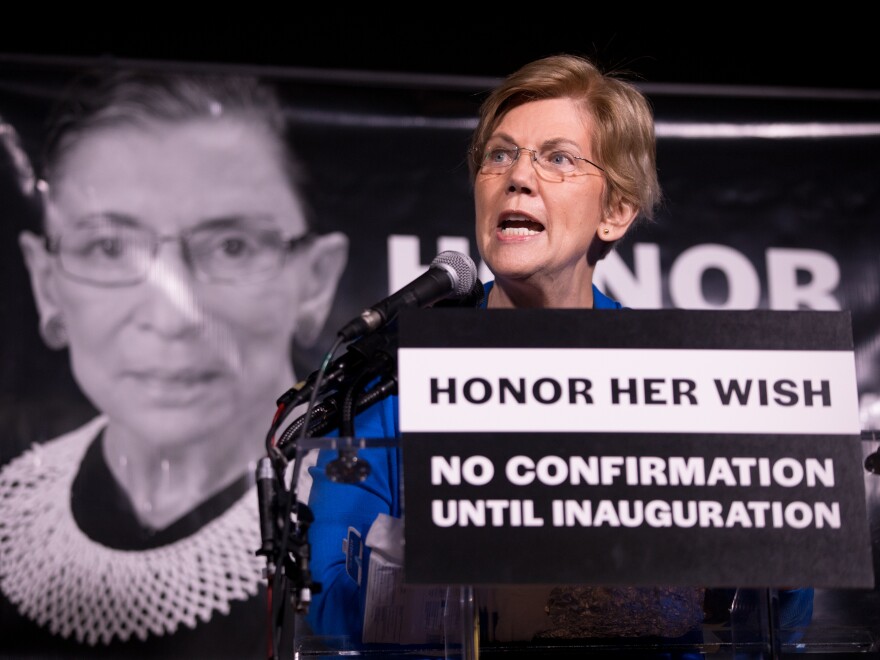Alicia Aguiano drove down to Washington, D.C., from Philadelphia this weekend to pay her respects to Justice Ruth Bader Ginsburg.
As she stood in front of the Supreme Court building, with its sidewalk covered in flowers and chalk tributes to Ginsburg, her voice quavered and she wiped at tears.
"I've just been super inspired by her. I really identify with her," she said. "I'm a lawyer, and I also teach at a law school. And so I fully recognize that I wouldn't be where I am if it weren't for her, and so I just felt the need to come down and pay my respects."
Aguiano had come down in part to attend a Saturday night vigil honoring the Supreme Court justice, who died Friday night. The vigil — hosted by a variety of activist groups, including the Women's March, Planned Parenthood Action Fund, and MoveOn Political Action — was part memorial service, part political rally. The crowd held candles as they listened to speakers celebrate Ginsburg's advances for women's rights, and also to exhort attendees to vote President Trump out of office.


Attendees said they felt that mix of mourning and political gravity.
"As a law student, I really see how impactful that it was that she did dissent on so many big decisions," said Olivia Mound, a law student at American University in Washington, D.C., her voice breaking. "It was such a display of her character and moral fortitude."
She added that Ginsburg's death makes her want to be more politically active.
"It adds that sense of urgency, me wanting to talk even more to people who might be on the fence about voting and to really approach people and be like, 'Hey, do you have a plan?' " she said. "Because this election means everything."

Ginsburg herself made sure her political desires were known as she approached death. Days before she died, she dictated a statement to her granddaughter to that effect, as NPR's Nina Totenberg reported: "My most fervent wish is that I will not be replaced until a new president is installed." (The White House is expected to name a replacement for Ginsburg as early as this week.)
There was a sense among some attendees that yes, they planned to vote against Trump, and yes, many planned to donate or volunteer (or both), but that Ginsburg's death has turned up their sense of urgency from an 11 to a 13.
"It's easy to watch the protesters walk by. It's easy to sort of let things go past you and support it silently," said Rachael Blumenberg, who lives in Washington, and attended with her mother, sister and daughter. "But I don't think we have the luxury of doing that anymore."


Those feelings were stoked by a packed program of speakers who included Sens. Kirsten Gillibrand, D-N.Y., and Elizabeth Warren, D-Mass. Warren drew some of the loudest cheers of the night when she condemned Republican Senate Majority Leader Mitch McConnell.
"Mitch McConnell and his henchmen believe that they can ram through a Supreme Court justice only 45 days from Election Day," Warren said.
McConnell famously refused to hold hearings for President Obama's nominee Merrick Garland in 2016, claiming he wanted to wait until the next president was elected to allow voters to "weigh in on whom they trust" to make that appointment.

"Mitch McConnell believes that this fight is over. What Mitch McConnell does not understand is this fight has just begun," Warren said, to raucous cheers.
One of the topics that received the most attention from speakers was abortion. Ginsburg was a strong proponent of abortion rights.
Jasmine Clemons spoke on behalf of the Planned Parenthood Action Fund, telling the story of her own abortion procedure.
"I made the best decision for my life, my future and my body," she said. "That was made possible because of women like Justice Ginsburg."


While some in the crowd were inspired to do more to vote Trump out, others said that Ginsburg's death changes nothing about how they're approaching the election.
Standing back from the crowd and listening quietly, Frank Panopoulos, a lawyer from Maryland, said that he's excited to vote against Trump this year, just as he was before Ginsburg passed.
"I was energetic before, and I will be energetic later," Panopoulos said.
Copyright 2023 NPR. To see more, visit https://www.npr.org.




